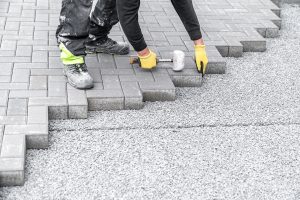 When installing a new driveway, you have a few options for materials. From asphalt to poured concrete and pavers to gravel, the choices can be overwhelming. Regardless, driveways are a significant investment, so you want to be confident in your decision. In this post, we’ll explain why paver driveways are best.
When installing a new driveway, you have a few options for materials. From asphalt to poured concrete and pavers to gravel, the choices can be overwhelming. Regardless, driveways are a significant investment, so you want to be confident in your decision. In this post, we’ll explain why paver driveways are best.
Asphalt, Poured Concrete, and Gravel Driveways
Before we elaborate on paver driveways, let’s briefly go over the pros and cons of other common driveway materials.
- Asphalt paving, also known as “blacktop,” is one of the most popular types of driveways because it’s relatively affordable, quick to install, and easy to patch or repair. However, the lifespan of asphalt driveways is shorter than that of other options (about 20 – 25 years), and since it absorbs heat, it can get very hot to the touch and even become sticky or gooey in high temperatures.
- Concrete is also a relatively affordable driveway material, but with a life expectancy of about 40 years, it lasts longer than asphalt. Yet, all concrete cracks eventually, and when it does, it’s more difficult to patch or repair than asphalt.
- Gravel is the cheapest of these three materials, but its challenges outweigh its affordability. Gravel is incredibly difficult to keep clear of snow—something we see lots of here in New England—and it generates a lot of dust, which inevitably settles on your car and the side of your home. Plus, since this loose gravel shifts over time, it ends up on your lawn and the street.
Concrete Brick and Permeable Concrete Paver Driveways
Meanwhile, pavers have more advantages to offer homeowners than other materials. Not only do pavers better withstand the test of time—up to 50 years for brick and 75 years for concrete or stone—they’re also easier to remove and replace when compared to large slabs of other materials.
Because the pieces are interlocking, they can flex with the environment, lessening their chance of cracking from freezing and thawing. Moreover, permeable pavers are designed to allow rainwater and snow melt to drain through to the ground below. The material is slip-resistant, ensuring safety, and stain-resistant, making driveway maintenance easier. Not to mention, pavers come in various colors, shapes, and sizes, and can be laid in different patterns.
So, before you rush to put down blacktop or dump some gravel, consider the long-lasting, low-maintenance, and clean-looking paver options. The higher cost upfront can save you time, money, and headaches in the future. At Dolan Landscaping, we’ve successfully installed hundreds of these paver driveways and completed hundreds more hardscaping projects. Contact us today to get started on your driveway or other landscape construction.